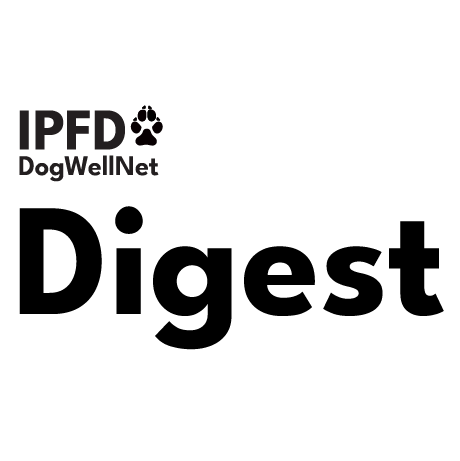In This Issue:
- News & Highlights
 Donate
DonateDid you find our content interesting or helpful? Help support the IPFD enhance health, well-being and welfare for dogs everywhere.

In This Issue:
IPFD in the News
 David Cavill's recent article in Our Dogs covers a brief history of collaborative efforts by kennel clubs, the formation of partnerships & IPFD's work to create a positive approach to enhance health and welfare for all dogs everywhere. Read it here.
David Cavill's recent article in Our Dogs covers a brief history of collaborative efforts by kennel clubs, the formation of partnerships & IPFD's work to create a positive approach to enhance health and welfare for all dogs everywhere. Read it here.
Articles
 A Comparison Across Countries for Brachycephalic Dogs: Using data from national kennel clubs, IPFD has compiled a summary of the numbers, the popularity, & percentage of registered French Bulldogs, English Bulldogs, & Pugs across 10 countries: How many are there? French Bulldogs, English Bulldogs and Pugs in Kennel Club Registries from 10 Countries
A Comparison Across Countries for Brachycephalic Dogs: Using data from national kennel clubs, IPFD has compiled a summary of the numbers, the popularity, & percentage of registered French Bulldogs, English Bulldogs, & Pugs across 10 countries: How many are there? French Bulldogs, English Bulldogs and Pugs in Kennel Club Registries from 10 Countries
Blogs
 In her latest blog post, IPFD Veterinary Science Officer Dr. Brenda Bonnett shares her presentation to the Embark Canine Health Summit April on 27 (available as video & PDF): Breeding healthy puppies & sustaining your breed: the goal & how do you get there?
In her latest blog post, IPFD Veterinary Science Officer Dr. Brenda Bonnett shares her presentation to the Embark Canine Health Summit April on 27 (available as video & PDF): Breeding healthy puppies & sustaining your breed: the goal & how do you get there?
 breeding result in reduced diversity, and over time may create health problems like poor reproductive capacity, lowered longevity, and more.
breeding result in reduced diversity, and over time may create health problems like poor reproductive capacity, lowered longevity, and more.
Breeds Resources
Breed of the Month
Brief Description:
One of Britain’s oldest indigenous breeds, the Bulldog is known as the National dog of Great Britain and is associated throughout the world with British determination and the legendary John Bull. The Bulldog was first classified as such in the 1630s, though there is earlier mention of similar types referred to as bandogs, a term reserved today for a type of fighting dog. Source: The Kennel Club
Bulldogs love to live indoors and be part of the family. They are generally amiable and easy-going, but can be stubborn. Estimates of lifespan vary from >6-7 to over 10 years of age. Care should be taken in breeding management of this breed to avoid selection of dogs with extreme morphological traits - traits which can lead to dogs suffering from a variety of health conditions.
Get a GRIHP! on the English Bulldog is part of a series to highlight the Big Picture of health, welfare, and breeding and to help develop Globally Relevant Integrated Health Profiles (GRIHPs) for many breeds.
Learn more about the English Bulldog in our Pedigree Breeds database.
IPFD Partners in Action
 Association (WSAVA), has recently published the latest edition of Dog Breeds: What You Need to Know, a regular feature in their online news section (and in the WSAVA Bulletin) that highlights IPFD resources on a particular breed with a focus on breed-specific diseases.
Association (WSAVA), has recently published the latest edition of Dog Breeds: What You Need to Know, a regular feature in their online news section (and in the WSAVA Bulletin) that highlights IPFD resources on a particular breed with a focus on breed-specific diseases.

You can also view previous editions of Dog Breeds: What You Need to Know in our archive article here on DogWellNet.com.
Harmonization of Genetic Testing for Dogs (HGTD)
 IPFD Hosts 2nd Virtual International Dog Health Workshop on Genetic Diversity
IPFD Hosts 2nd Virtual International Dog Health Workshop on Genetic Diversity
On May 3, we hosted our second virtual workshop, Genetic Diversity. Focusing on genetic diversity (primarily from a genetic tests/tools view), 60 participants - including representatives from IPFD and our Partner kennel clubs, genetic test providers, breeders, and other key stakeholders - came together online to identify genetic diversity tools and resources, and to discuss priorities and actions for the benefit of all dogs.
A very special thank your to our distinguished panel, which included Prof. John Woolliams (The Roslin Institute, UK), Samantha Hauser (Embark, USA), Katy Evans (Guide Dogs, USA), Saija Tenhunen (Viking Genetics, FI), Pieter Oliehoek (Dogs Global, NL), and Sally Ricketts (University of Cambridge, UK), for sharing their time and expertise with us!
Stay tuned for more on workshop outcomes and next steps!
Ask Aimee

Our HGTD Project Manager, Aimee Llewellyn-Zaidi, provides answers to your questions on canine genetic testing in Ask Aimee. In her latest post, Ask Aimee: I'm concerned about DM (degenerative myelopathy) in my dog, what new information should I share with my vet?, an experienced breeder of French Bulldogs expresses concerns that her middle-aged dog was showing "classic" signs of Degenerative Myelopathy (DM).
If you’d like to submit a question to Aimee, please email her at aimee.llewellyn-zaidi@ipfdogs.com.
Get Involved in HGTD!
We welcome additional participant GTPs, more collaborators from any stakeholders concerned with dog health and welfare, the advice of experts, the participation of breed clubs and other consumer groups. We stand ready to provide more information to ongoing discussions.
 Please feel free to contact us as we work together for healthy dogs and to support those who breed and own them: HGTD Project Manager, Aimee Llewellyn-Zaidi.
Please feel free to contact us as we work together for healthy dogs and to support those who breed and own them: HGTD Project Manager, Aimee Llewellyn-Zaidi.
Correcting the Confusion around Degenerative Myelopathy
Jerold Bell, DVM, Adjunct Professor of Genetics  Department of Clinical Sciences Cummings School of Veterinary Medicine Tufts University, USA, Chairman, Hereditary Disease Committee, World Small Animal Veterinary Association (WSAVA), and IPFD friend and collaborator has written the definitive paper on Degenerative Myelopathy (DM), DEGENERATIVE MYELOPATHY-DIAGNOSIS AND INHERITANCE.
Department of Clinical Sciences Cummings School of Veterinary Medicine Tufts University, USA, Chairman, Hereditary Disease Committee, World Small Animal Veterinary Association (WSAVA), and IPFD friend and collaborator has written the definitive paper on Degenerative Myelopathy (DM), DEGENERATIVE MYELOPATHY-DIAGNOSIS AND INHERITANCE.
IPFD Veterinary Science Officer Dr. Brenda Bonnett summarizes Dr. Bell's paper in a new article on DogWellNet:
"This information is needed and must be disseminated widely – to veterinarians, breeders, kennel and breed clubs, and owners to counteract many areas of misunderstanding and confusion about this diagnosis and about genetic testing for it. This paper brings together the evaluation of the best evidence, consultation with experts and researchers, and an understanding of the issues in both veterinary practice and the world of breeders. We encourage all to read and share this paper, to try to revise/reverse some of the problems that have arisen due to confusion and over-reaction about the condition and testing."
In her summary, Brenda also provides key excerpts from the paper and some additional comments from IPFD, including the 'bottom line' on the DM testing issue:
"Given the relative uncommonness of this disease, and its generally late onset, breeders must be cautious about prioritizing control of this condition over other diseases and health concerns which are more common, or important in all breeds. Yes, this is a devastating disease for dogs and owners, but it is not appropriate to implement breed-wide control measures like eliminating sod1 homozygous dogs from breeding. “The greatest issue with the misuse of sod1 genetic test results (both in breeds with and without confirmation of affected DM dogs) is where breeders are devastating their gene pool diversity by selecting against the sod1 variant.” Simply put: excessive use of this test will negatively impact the overall health and genetic diversity of the breed."
IPFD is truly a "people driven" service organization. We allocate the bulk of our financial resources to maintain a small but dedicated team of consultants to manage our modest resources and facilitate the activities of our stakeholders, with the aim of achieving our collective goals.
You can specify how your donation is used (support IPFD and its programs and activities OR support the Harmonization of Genetic Testing for Dogs). All donations are handled securely via PayPal.
Click Here to Make a Donation Now
Members can opt to receive notifications by email. Are you on our email list? Click here to edit your Notification Settings (you must be logged in to your account).
Viewing as a Guest? Sign in or register now to get the most out of DogWellNet.com.
Click an icon below to visit our social media sites:
By using this site, you agree to our Terms of Use.
Recommended Comments
There are no comments to display.
Join the conversation
You can post now and register later. If you have an account, sign in now to post with your account.
Note: Your post will require moderator approval before it will be visible.